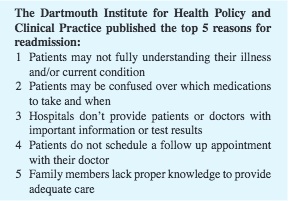Help avoid readmission with non-medical in-home care
by Lauren Hewitt and Brian Freeman; Owners of Griswold Home Care
Hospitals are great when you need them but everyone’s goal is to stay out. It seems obvious for individuals to want to avoid readmission, but hospitals are also very motivated. In October of 2012, Centers for Medicare & Medicaid Services (CMS) within the Department of Health & Human Services (HHS) began penalizing hospitals for high readmission rates.
The goal is to cut the escalating issue of patient readmission costs, which cost the health care industry more than $17 billion a year. And when health care and hospitals pay, we all pay – with increased health care costs and decreased access to quality care. But luckily, many of these readmissions are preventable with coordinated care after discharge.

When patients don’t fully understand the discharge instructions or have the ability to self-manage their care, using a team-based approach is the only way to sustainably reduce these avoidable circumstances. Non-medical in-home care is a critical partner that discharge planners can use to combat readmissions.
From a few hours a week to 24×7 availability, non-medical in-home care can be tailored to an individual’s unique needs. A professional caregiver can assist with medication reminders, accompaniment to doctor visits, assistance with ambulation and transfers, and critical companionship as you recover.
Medication reminders ensure medications are taken as directed by their physicians. Incorrect or inconsistent medications are a leading cause of readmissions.
Accompaniment on outings with a professional caregiver experienced in assisting patients can provide a smoother, safer experience. Including the caregiver in the appointment can also provide another set of ears to understand doctor’s instructions. Returning to routine activities such as church, visits with friends, or time enjoying nature will bring back a sense of normalcy.
Post hospitalization isn’t the time to learn how to operate equipment vital to recovery. When assistance with ambulation and transfers, a professional caregiver can reduce risk of falls and injuries. Falls or other injuries can dramatically impact the ability to recover from your original illness.
Companionship is often overlooked as a recovery tool. Positive, supportive relationships are key to anyone’s well being. When recovering from an illness, depression, anxiety and fear can be overwhelming. Will I be myself again? Why me? Companionship can allow someone to move past the negative thoughts and regain a positive attitude. And a healthy attitude can aid in recovery. The power of positive thinking has been shown to be a key component in healthy lifestyles.
No matter what age, post surgery routines often dictate the success of the surgery and require some form of rehabilitation. Very often in older adults, this means a stay in a skilled nursing facility. Of course, being away from home, and missing family and friends can make the road to recovery feel very long. A non-medical in-home caregiver, in combination with home health care, can be an alternative to recovery in a facility. This approach provides individuals looking to maintain their independence an alternative to traditional, in-patient, post surgery rehab. One-on-one care focuses on your goals for recovery.
Post surgery pain can also often be alleviated when you’re able to rest and avoid distractions like meal preparation, housekeeping, and worrying about how to get to appointments. A professional caregiver can prepare fresh meals made for just you, and take care of other day-to-day tasks without a worry.
In most circumstances, people rehabilitate better in their home setting, a familiar comfortable environment that promotes overall healing physically and spiritually. Individuals suffering from all illnesses, and especially dementia, can thrive and heal faster in a familiar environment.
It is a win-win for everyone to recover fully from an illness without an unnecessary hospital readmission. Following your doctor’s instructions, and taking care of your physical, emotional, and spiritual health are major factors in recovery. Personalized attention, on your schedule, in your home provided by a professional non-medical in-home caregiver can be a key part of your wellness plan.



